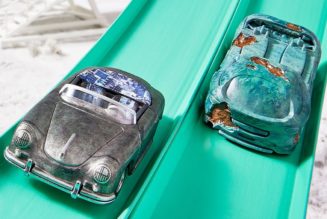
Welcome to CNBC Select’s advice column, Getting Your Money Right, where financial advisor Kristin O’Keeffe Merrick will be answering your pressing money questions. You can read her last installment here on how to avoid emotional investing. Have a question you want to ask? Send us a note at AskSelect@nbcuni.com.
choochart choochaikupt | iStock | Getty Images
My partner and I are stressed out about money. We are both high earners and make a combined of over $500,000 a year. Yet, we are finding it difficult to make ends meet and we fight about it incessantly. We have a mortgage, cars, kids — there are just so many expenses. We can’t seem to get a handle on our spending. As a result, we have nothing saved and are accumulating credit card debt. I never imagined that we could make this much money and still feel this stressed. What should we do?
Signed,
Stressed in Seattle
Dear Stressed,
First, I would like to assure you that this is not a unique problem. This is something that many people deal with every day. When we think about money stressors, we don’t expect it to happen when we are making a lot of money. However, this issue has become more commonplace. During the past few years, we have seen prices rise in all aspects of life—from food and travel to subscription services.
However, I want to be clear. This is not inflation’s fault. The reality is that you are likely living beyond your means. Let’s break down this issue and talk about how to address it.
You spend too much money
As a financial advisor, I talk to a lot of people about their money on a day-to-day basis. Most of my clients, colleagues and friends earn a good living and would be considered “highly compensated” by any measure. Even so, I find myself marveling at their lifestyles and trying to understand how they afford it all. “Wait, you’re taking your entire family to Europe again? A pool? A new Porsche? How?!”
The reality is that many people are living beyond their means and are buried in debt. It happens slowly over time and can eventually become a very large problem. They somehow think that if they work harder, then maybe this whole thing will just get better. It will not.
I call this situation “financial fragility.” If you had an emergency and needed money in a hurry, you wouldn’t be able to drum up the cash. To be clear, there’s a difference between a short-term liquidity crunch and living beyond your means. For example, this spring we had to replace our chimney (the entire thing), our furnace and our air conditioning unit—all in the same week. All it took was a few days to completely wipe out our emergency fund. This created a liquidity crunch we had to manage for a few months, but that’s not the same as living in a constant state of terror about paying all of your bills.
It may seem impossible for a family making $500,000 a year to be financially fragile, but it’s easily explained when you realize that every time you get a pay raise or bonus, you simply spend more and succumb to “lifestyle creep.”
In other words, instead of making the most of raises and implementing a savings and investing plan, you simply roll that raise into your day-to-day spending and suddenly this new lifestyle becomes your baseline. A less fun (but more prudent) way to use that new income would be to put it in a high-yield savings account as part of your emergency fund. The LendingClub High-Yield Savings account, for example, doesn’t require a minimum balance or charge any monthly fees, but it earns you a high APY. The UFB Premier Savings account is also a good choice if you want your emergency fund to earn a high amount of interest.
LendingClub High-Yield Savings
LendingClub Bank, N.A., Member FDIC
-
Annual Percentage Yield (APY)
-
Minimum balance
No minimum balance requirement after $100.00 to open the account
-
Monthly fee
-
Maximum transactions
-
Excessive transactions fee
-
Overdraft fees
-
Offer checking account?
-
Offer ATM card?
UFB Premier Savings
UFB Premier Savings is offered by Axos Bank, a Member FDIC.
-
Annual Percentage Yield (APY)
Earn up to 5.06% APY
-
Minimum balance
-
Monthly fee
-
Maximum transactions
No max number of transactions; max transfer amounts may apply
-
Excessive transactions fee
-
Overdraft fee
Overdraft fees may be charged, according to the terms, but a specific amount is not specified; overdraft protection service available
-
Offer checking account?
-
Offer ATM card?
-
Terms apply.
Build a sustainable framework
To build a financially sustainable lifestyle, we need to start with some simple math. What are your fixed costs each month or quarter? Do you make enough to cover your fixed annual costs? Hopefully, the answer is yes. If it is not, then you need to do some serious cost-cutting.
Fixed costs are reoccurring expenses you can anticipate — mortgage, car payments, childcare, taxes, utilities, food, school fees, and insurance. You should know these expenses off the top of your head and have enough on hand each month to cover them.
Next, you need to estimate what your spending is for categories like travel, personal spending, entertainment, dining out, and activities for the kids. Can you afford all of these expenses? If you are not able to save each month and are carrying balances on your credit cards, the answer is obviously no.
The work begins with trying to figure out how to lower these expenses:
- Travel and dining out/ordering in are most likely the easiest areas to address. These are luxuries that you can scale back on.
- Create a plan and budget for your vacations. Planning ahead allows you to be thoughtful about where to go and can also allow you to avoid paying top dollar at peak times.
- Another area is to think about the cars you are driving. Cars have become increasingly expensive over the past few years. Do you need two fancy cars? What if you traded in one of your cars for something more modest?
Finally, I have two kids, and sports and camps alone can cost thousands each year. Look at what you’ve spent on your children’s hobbies and activities during the past year (and what you think you’ll spend next year). Can you afford all of these clinics, camps, and lessons? If not, you need to scale back.
Compare offers to find the best savings account
Quit the comparison game
The biggest issue fueling lifestyle creep is the little voice in your head comparing your finances to others. Please do not do this. This is a waste of time and energy and it will never bring you joy.
Instead, think about your own personal happiness. Imagine a life where you were less stressed about money — wouldn’t that bring you more happiness than having bragging rights about going to Maui in December? The end goal is to get you to a place where you have ample savings and investments and aren’t in a panic trying to make ends meet at the end of each month.
Bottom line
The amount of money you make does not, in my opinion, directly impact your happiness. Money can make life easier, but there are plenty of people who are both rich and miserable. I’m not asking you to feel sorry for them — especially when so many struggle with a lot less than $500,000 a year — but it’s a good reminder that if our spending is out of control, you’ll face financial stress no matter how wealthy you appear.
Kristin O’Keeffe Merrick is a Financial Advisor and money expert at her family-run firm, O’Keeffe Financial Partners, located in Fairfield, NJ.
Catch up on CNBC Select’s in-depth coverage of credit cards, banking and money, and follow us on TikTok, Facebook, Instagram and Twitter to stay up to date.
Editorial Note: Opinions, analyses, reviews or recommendations expressed in this article are those of the Select editorial staff’s alone, and have not been reviewed, approved or otherwise endorsed by any third party.








